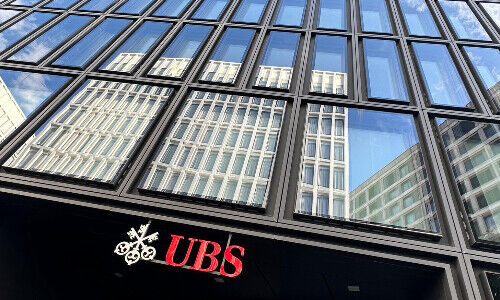The astounding performance of the UBS share price over the past 12 months has been one of the biggest positive surprises on the Swiss stock market. But the joy may soon be overshadowed – with the Federal Council partly the culprit.
Over a period of 12 as well over 6 months, the UBS stock has surprised an exceptionally large number of investors after unexpectedly making massive gains in the short and long term. Within a year, it’s advanced more than 60% and since October, 30%.
That’s all the more remarkable given the fact the main business of Switzerland’s largest bank is widely known: wealth management at home and abroad, coupled with an investment bank with «supply functions.» And with the state-mandated takeover of its struggling arch-rival Credit Suisse (CS) a year ago, UBS had to shoulder some additional risks.
Upbeat Mood
So what is the source of the interest or speculation in the UBS share? The bank has of course been able to greatly enhance its market position inside and outside Switzerland with the help of the integrated CS. An activist investor, Swedish company Cevian, has also got in on the act and will stop at nothing to drive the share price up to its target of 50 Swiss francs (currently it’s at 28 Swiss francs). UBS’s senior management has also been adept at arranging the ongoing absorption of its former rival.
On top of this, the price has been given further impetus from a series of financial analysts throwing out buy recommendations almost like confetti, most recently the Royal Bank of Canada (RBC) on Monday (yesterday). But the upbeat mood could soon be coming to an abrupt end, as some investors fear.
Stricter Capital Requirements – Higher Liquidity
The reason? The Federal Council’s report on systemically important banks (i.e., Too-big-to-fail, TBTF), which is set to be published after Easter. The precise date is still unclear. But experts expect it to be April 10 or April 17 2024 at the latest. The Federal Council meets every Wednesdays.
It will present its evaluation of last year’s CS debacle in its TBTF report, particularly in the context of systemically important financial institutions in this country. As was the case after the global financial crisis of 2008 and the previous UBS rescue with state funds, the thinking this time round is still turning to stricter (own) capital requirements and higher liquidity.
Time to Take Profits
This is making investors skittish. If the definition of capital or the Common Equity Tier 1 ratio (CET1) is legally tightened, free cash flows earmarked for dividend payouts will inevitably decrease.
Several financial analysts in the English-speaking world have already anticipated this and are warning of a «negative surprise.» The recent surges in the UBS share price since February could also tempt some investors to take profits, driving the price down even further.
No Excessive Price Expectations
This might well put the UBS stock back to a «fairer» valuation, with no excessive price expectations that are never sustainable in the long run. The biggest bank in Switzerland would then have the opportunity once again to show that it is the best and largest asset manager in the world and be considered the number one in the domestic market – in the long term.




































